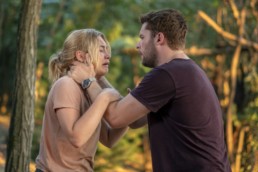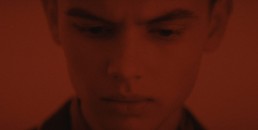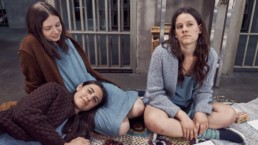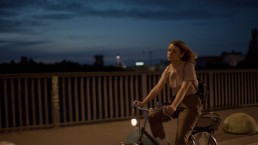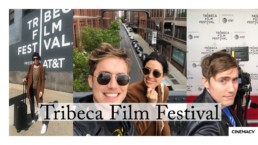'Midsommar' Is Here to Scare the Daylights Out of You
Before I start writing any film review, I like to listen to music that reflects the tone of the film so I can reorient myself back into the fictional world of the movie. While I didn't find the official soundtrack for Midsommar anywhere online, I did find a Spotify playlist called "Midsommarmorgon," which felt like the universe wanted me specifically to listen to it ("morgon," phonetically similar to "Morgan," means "morning" in Swedish).
An innocent enough coincidence, undoubtedly. But after watching the visionary horror film Midsommar, you find that even unquestioned assumptions can hide dark and deadly truths.
A surrealist drama based on heartbreak and psychotic unraveling, Midsommar is edge of your seat horror at its best. After Dani (Florence Pugh) receives unexpected news of a family tragedy, she turns to her emotionally unavailable boyfriend Christian (Jack Reynor) for support. More so out of guilt than good intention, he haphazardly invites her to join his upcoming boys trip to rural Sweden, planned by their mutual friend, Pelle (Vilhelm Blomgren). Hesitant, but ultimately agreeing to go, Dani finds herself in a remote Swedish village celebrating "Midsommar," a week-long festival and tradition that brings together members of a small, off-the-grid community, who gather to reflect and pay homage to their ancestors.
The blonde-haired, blue-eyed Swedes welcome Dani, Christian, and their friends Josh (William Jackson Harper) and Mark (Will Poulter) with open arms. Like a scene from a folklore fairytale, the vibrancy of the natural surroundings and their matching ancestral garb, paired with the seasonal occurrence of 24-hour sunlight, squash most initial feelings of uneasiness. Not all, but most. Dani struggles to strengthen her connection with Christian during the trip, which seems to get better when they endure the rituals of the festival together. However, as the gatherings turn darker and alarmingly more deranged, the group soon discovers that the festival masks a much more harrowing and threatening experience.
Midsommar is another grand slam for the beloved A24 production company, as well as director Ari Aster & all involved. It's Florence Pugh as the terror-induced Dani who carries the weight of the film, and whose blood-curdling screams rival that of Toni Collette's in Aster's breakout directorial debut, Hereditary. Midsommar accomplishes great visual moments as well; the cinematography soars and glides so seamlessly that it feels like a VR experience, and psychedelic drug trips are so visceral that they feel like extended sequences of Gaspar Noé's recent horror-hallucination film, Climax.
Now, the question on everyone's mind: how does Midsommar compare to Hereditary? I'd say the answer is complicated. If you're looking for more subtle psychological torture, you may find Midsommar to be too grandiose (at 2 hours and 20 minutes, it's certainly a challenging amount of excessive violence to bear). However, the world Aster imagines in this isolated commune is achingly beautiful, only made better by empowering our young female heroine. So while Hereditary may have put indie director Ari Aster on the map, Midsommar solidifies him as the current king of horror.
Day or night, it doesn't matter when you watch Midsommar: the slow-building tension creates energy so palpable it will do more than give you chills, which I can attest to, as I actually had a nightmare the night after watching. So I'll probably need to wait to watch this one again, as well as pause on listening to that Spotify playlist – for now.
Stylized Sci-Fi is Backed by Flying Lotus in 'Perfect'
The last project we saw from director Eddie Alcazar can best be described as a mental mind f*ck, and that's a compliment. His 2016 short film and Vimeo staff pick, FUCKKKYOUUU, revels in elements of grindhouse horror and experimental absurdity. While Alcazar's first narrative feature, Perfect, may be toned down a notch or two by comparison, it still maintains its predecessor's ambitious and mesmerizing visuals and meditative look at reality.
Produced and scored by Flying Lotus and executive-produced by Steven Soderbergh, Perfect is stylized sci-fi at its wildest. After the murder of his girlfriend, a young man (Garrett Wareing) is sent to a clinic for the emotionally troubled and disturbed. His actions have become uncontrollable and, at the request of his mother (Abbie Cornish), he will be required to stay there until he is deemed "fixed." Once at the clinic, he is monitored and set to undergo conditioning that will strengthen his body & mind to ultimately reach perfection.
Sounds normal, right? Turns out, this is anything but your normal wellness retreat. At this futuristic clinic, perfection is achieved by literally cutting open one's body and planting plug-and-play characteristics directly into oneself. These implants will cure him, whose new name is Vessel 13, by using technology to mutate his current perception and free him from his "base animal programming." But Perfect begs the question, is "perfection" something this world needs?
This film isn't for the general audience, but neither was it made for them. There were brief moments when Perfect reminded me of Paradise Hills, but luckily that didn't make me like the film any less or take me out of the dynamic world Alcazar shows on screen. The music montages backed by Flying Lotus are incredibly fulfilling and the minutes-long one-take towards the end is practically, dare I say, perfect.
Takeaway
Perfect is a bold expression that will be best enjoyed with an open mind; if you choose to watch the film, enjoy the mind-bending visual trip.
Miraya Berke: "I knew rom com fest had to happen"
It seems that Romantic Comedies were the logical genre for Miraya Berke to add to her growing portfolio of curated, unique events. Having proven herself as a successful entrepreneur with the launch of Dessert Goals – a dessert festival with pop-ups in NY and LA (sign me up!) – Berke has now shifted her focus to another passion. After all, her main goal is to create experiences that "spark delight," and what better way to do that than with Rom Coms, especially when paired with desserts and rosé?
In my exclusive interview with Berke, we talk favorite romantic comedies, the festival's celebrity curators, and so much more.
The festival runs June 20th through 23rd, for more information on tickets and badges, click here.
A Rom-Com festival is a genius idea. Thank you for this. Where did the idea come from?
I am a huge Rom-Com fan, that's always been my favorite genre. Whenever I want the happy pick-me-up, rom-coms are what I turned to. My background is in event planning. I started Dessert Goals a few years ago in LA and New York, which showcases local dessert vendors and creates experiences for people to come together and spark joy. After Dessert Goals, I've been thinking of what else really makes me happy, which was a rom-coms!
With Rom Com Fest, I wanted to highlight both classic and new films and make it experience based. We're bringing in awesome dessert vendors, costumes, arts and crafts, and celebrating the genre and community.
I don't know if I should admit this, but my favorite film is The Wedding Singer. Total rom-com.
Oh, that's so great!
What was the first step you took to make this dream a reality?
It's been a whirlwind. I had this idea in October of 2018 and knew it had to happen. First I started thinking about the design, then started talking to people and building an advisory board, and then choosing a venue. I stumbled upon the Downtown Independent in LA and it's the perfect theater to house the festival. It's one cinema and it has a large lobby, so it felt like the perfect place to have these different events and experiences that I was imagining.
That was the first step. These last few months it's been posting the submissions information for new films on Film Freeway, watching films, and [building the lineup.] There've definitely been moments of extreme overwhelm, but I put myself through it because I know how much fun it's going to be. I like to visualize all the smiling faces at the end. It just feels really worth it.
As an entrepreneur, how do you relax or decompress at the end of a long day?
I feel like I'm always figuring that out. I think movies and TV are a big way of relaxing for me, usually with dessert or some wine and popcorn and cuddled up in PJ's. This feels like the easiest way to unplug.
I noticed Rachel Bloom of "Crazy Ex-Girlfriend" is curating a screening (Never Been Kissed). I actually went to a theater camp with Rachel years ago, it's cool to see her and other women doing great things in film/TV. How did that collaboration come about?
I'm a huge "Crazy Ex-Girlfriend" fan as well. My boyfriend and I were doing long distance for a while and that was the TV show that we would watch together all night by hitting "Play" at the same time. We watched all the seasons living across the state from each other. I feel like she has so cleverly tapped into the psyche of modern-day rom-coms, so when I was building my dream wishlist of the festival, I wanted her to be involved in some way. Her managers replied to one of my emails and said she was really excited about it and asked if she could curate her favorite rom-coms.
[Rachel] suggested Never Been Kissed, which feels like a perfect addition, and it's actually going to be the 20th-anniversary screening! Rachel will be doing a fireside chat afterward too. And we also have a craft project before the film, we'll be making these cute little conversational heart pins.
Another cool partnership is with Not Pot– I read you'll be passing out CBD gummies before one of the screenings?
Yeah! Similar to the talent, I made a dream wishlist of brands that I would love to team up with. CBD products are super trendy right now and their branding is so on point with the style of the fest, plus the founder is based in Los Angeles. We feel like this is the perfect collaboration with How Stella Got Her Groove Back because it's based in Jamaica and all about her relaxing. Having a CBD gummy while watching a film dressed in your PJ's felt like the perfect kind of mash up for film experience.
Final thoughts before the festival next weekend?
I usually set very high expectations for myself. It would be easier if I have fewer expectations, haha. I know that it's my first year and there are so many unknowns, but I feel very proud of what I've put together.
'The Proposal': Til Death Do Us Part?
THE PROPOSAL (2019)
Starring Jill Magid, Federica Zanco
Directed by Jill Magid
Distributed by Oscilloscope Laboratories. 86 minutes. Opening this Friday at the Laemmle Monica Film Center.
At first glance, the synopsis of The Proposal is difficult to decipher. The poster reflects a black and white image of a man in a diamond-shaped box with a large manicured hand gripping it's top. A woman, much smaller in scale and with her back turned, examines the bottom of the diamond. This image may seem open to interpretation, but the poster, like the film, is a deliberate and meaningful work of art in its own right.
The image's complexity is a reflection of the tumultuous relationship between the desire to share the work of deceased artist and architect Luis Barragán, propelled by director Jill Magid, and Federica Zanco, the woman who legally controls Barragán's archive. This documentary, which is executive produced by Laura Poitras, plays more like an upbeat mystery than a retrospective of the life and work of Barragán. Yes, those who are interested in the legacy of one of Mexico's most infamous artists, considered a poet among architects, will no doubt enjoy this visually abundant film. And those who are not yet familiar with him or his work will be exposed to some of the most breathtaking works of art.
Jill Magid makes it her personal mission to unlock Barragán's archives from their undeserved vaults by traveling from her home in NYC to Barragán's former home in Mexico to the Vitra Corporation in Switzerland where she eventually meets with Federica face to face. Barragán's work was sold to Federica and her husband years ago, so legally she can determine their future. But for Jill and other fans of the artist, keeping his work away from the public feels like a disregard for moral responsibility. The Swiss Corporation has been extremely secretive, holding Barragan's work hostage for enormous sums of money. As described in the film, it's "active censorship perpetuated through capitalism."
The film's title – The Proposal – refers to the unconventional way Jill bribes Federica to return the archived works to Mexico. Her proposition garnered national attention for it's controversial, yet creative, initiative and is something that must be seen to be believed. The Proposal, a stunning debut feature from Jill Magid, feels a little self-indulgent at times but is fully sincere in its execution, making this real-life art mystery a necessary addition to your "must see" list.
Mike Mills and The National Made a Short Film
On Tuesday, May 7th, the Ace Hotel in Downtown L.A. hosted the premiere screening of Mike Mills' latest work in conjunction with The National, I Am Easy To Find. The night was a celebration of all sorts; Mills (20th Century Women, Beginners) couldn't contain his excitement after admitting he had always dreamed of debuting a film in the iconic theatre, "the home of Charlie Chaplin." Directing following the screening and Q&A with Mills, (conversation below), The National's upcoming album was played for the audience in its entirety.
Running just 24 minutes long, I Am Easy To Find is a beautiful look at aging, isolation, and humanity through a breathtakingly grounding performance from Alicia Vikander. The evolution from infant to teenager to adult to elder is a journey we all take (some longer than others), but witnessing this simple yet profound miracle on the big screen feels like an otherworldly experience.
The film and The National's "I Am Easy To Find" album will be released on Friday, May 17th.
Pre-order album now at https://thenational.ffm.to/iaetf.oyd
Brainwashed by The Beatles, 'Charlie Says' Shows Life After Manson's Reign
CHARLIE SAYS (2019)
Starring Matt Smith, Hannah Murray, Sosie Bacon, Suki Waterhouse
Directed by Mary Harron
Screenplay by Guinevere Turner
104 minutes. Rated R. Opening this Friday in select theaters. On VOD May 17th.
What does it say about our culture that every time a new crime related film, TV show or podcast lands on our radar, it can so quickly become the latest sensation? Since the beginning of 2019, Netflix's Extremely Wicked, Shockingly Evil and Vile, HBO's The Case Against Adnan Syed, and Hulu's The Act, are just a few of these that have found a loyal fanbase among the curious and intrigued. Adding to this growing repertoire of fascinating evil acts made for public consumption is director Mary Harron's biopic Charlie Says, a film that chronicles how one teenager went from an innocent all-American girl to cold-blooded killer.
Charles Manson believed he was more popular than Jesus. He thought that when the apocalypse came, he would be responsible for starting a new community and life on Earth after cryptic messages from "Helter Skelter" on The Beatles' White Album directed him to. Clearly, Charles Manson was not mentally sound. So how did he convert so many men and women into believing in him, following him, and committing heinous crimes on his command? Charlie Says is an attempt to answer this question by infiltrating the minds of three of his "Earth Mothers": Leslie “Lulu” Van Houten (Hannah Murray), Patricia “Katie” Krenwinkle (Sosie Bacon), and Susan “Sadie” Atkins (Marianne Rendon).
This approach should have been enough to make Charlie Says a powerful and – dare I say – sympathetic look at how these impressionable women fell under the spell of a manipulative and maniacal demigod. Unfortunately, the dive doesn't feel quite deep enough to make an emotional impact. It's a lot to tackle in just 104 minutes, but Charlie Says, which is mostly told through flashbacks, unsatisfyingly skims the surface of what could have been a multi-part series about three women who can finally think for themselves and reflect on their actions as they sit in prison for life.
Matt Smith as Charles Manson is one of the film's stronger pillars, he completely transforms into the enthusiastic and arrogant, yet musically adept, cult leader. As an ensemble piece, Charlie Says is very impressive. Strong performances from Murray as the lead, as well as supporting actors Kayli Carter (Private Life), Chace Crawford, and Merritt Wever round out a solid cast. Another strong visual is the styling (many of the girls' outfits ended up on my Pinterest board).
Charlie Says has made its way through the festival circuit (Venice Intl Film Festival, Tribeca Film Festival), finally finding a home at IFC Films. It may not be the strongest biopic of a murderer and the heartbreaking aftermath, but it's definitely worth a watch... if you're into that sort of thing.
'Softness of Bodies' Review: A Portrait of a Narcissistic Poet
SOFTNESS OF BODIES (2018)
Starring Dasha Nekrasova, Morgan Krantz, Nadine Dubois
Directed by Jordan Blady
Screenplay by Jordan Blady
74 minutes. This film is not yet rated. Now available to stream on VOD sites including Amazon and Vimeo.
Art loosely imitates life in writer/director Jordan Blady's stylish feature film Softness of Bodies.
Starring real-life poet Dasha Nekrasova as a struggling artist trying to make a living in Berlin's competitive art scene, this dark comedy plays perfectly into the stereotype of the entitled millennial and the assumption that creative drive will equal monetary success. Unfortunately, like most people working in the arts, our protagonist learns the hard way that just because you want something, doesn't mean you are destined to have it.
Charlotte Parks (Nekrasova) is an American poet living in Berlin on a year-long arts grant. She pours coffee at a cafe during the day, steals clothing from the local mall in the afternoons, and attends poetry slams at night. Her routine is unconventional but stable. That is until a tidal wave of changes hit her, hard. First, Franz (Moritz Vierboom) the man she was having an affair with breaks up with her. Next, her ex-boyfriend Oliver (Morgan Krantz) unexpectedly shows up in town, along with resurfacing emotions and feelings. And then, Charlotte's kleptomaniac ways catch up with her, literally, when she is caught stealing and forced to pay 800 euro or risk jail time. All of this happens while she is struggling to make ends meet and can barely afford her next meal, let alone pay her way out of trouble, but a silver lining of hope appears when she learns that she is a finalist for a poetry grant in a major competition. The question is, can she overcome her personal baggage in order to fulfill her lifelong dream of becoming a recognized poet?
Softness of Bodies can be a frustrating watch when the script focuses on Charlotte's unrelenting sense of entitlement and narcissism, but its stylish vibe has a way of romanticizing being young in a foreign city. Chain-smoking in a Berlin bar while working through emotions from past lovers has a nostalgic attachment that feels whimsical. The Euro-electro synth score adds to the uncertainty of Charlotte's future and the volatile nature of her situation.
Dasha Nekrasova's performance is raw and untraditional, she plays the "victim" card well. Nekrasova ends every sentence with a downward inflection, giving off a vibe of arrogance and whininess, making it hard to sympathize or feel sorry for her. When things don't go her way, she complains without showing any true effort to right her wrongs, but that's not to say that Charlotte doesn't learn lessons, she just learns them the hard way.
A thrilling and engaging watch, Softness of Bodies is a solid debut from first-time narrative feature film director Jordan Blady. It will appeal to the viewer who can identify with the struggling artist existence, and this coupled with the original poetry from Dasha Nekrasova herself, makes Softness of Bodies a full artistic experience.

